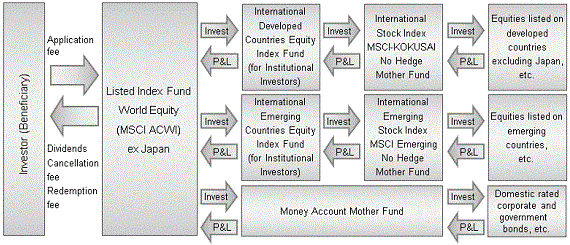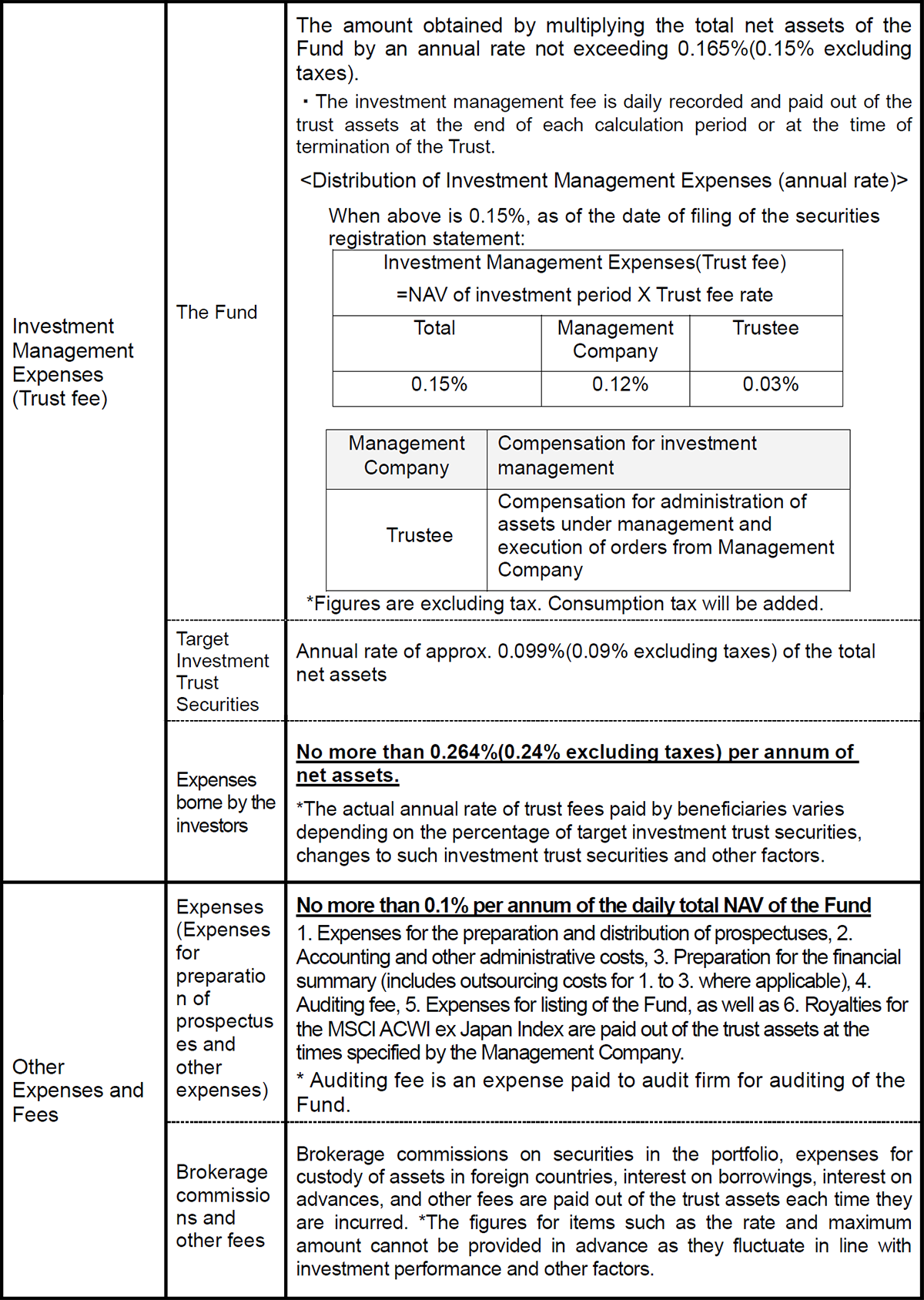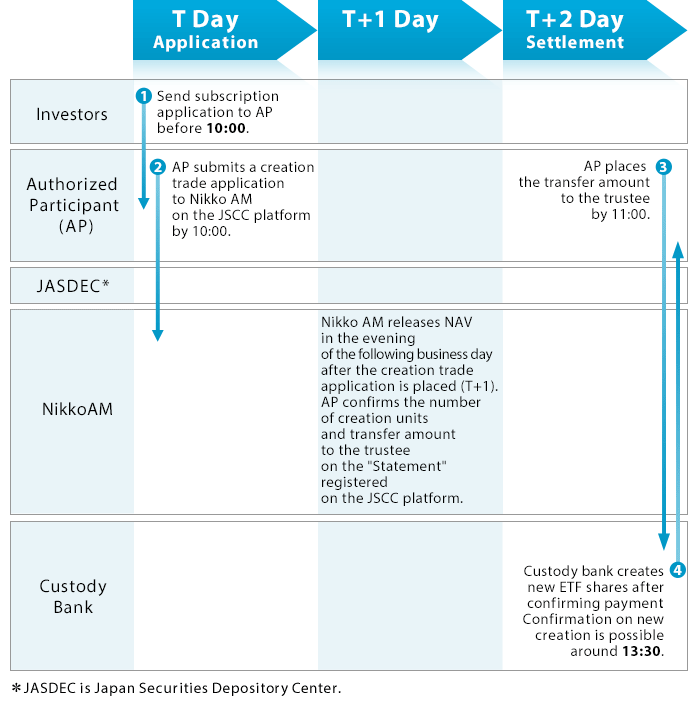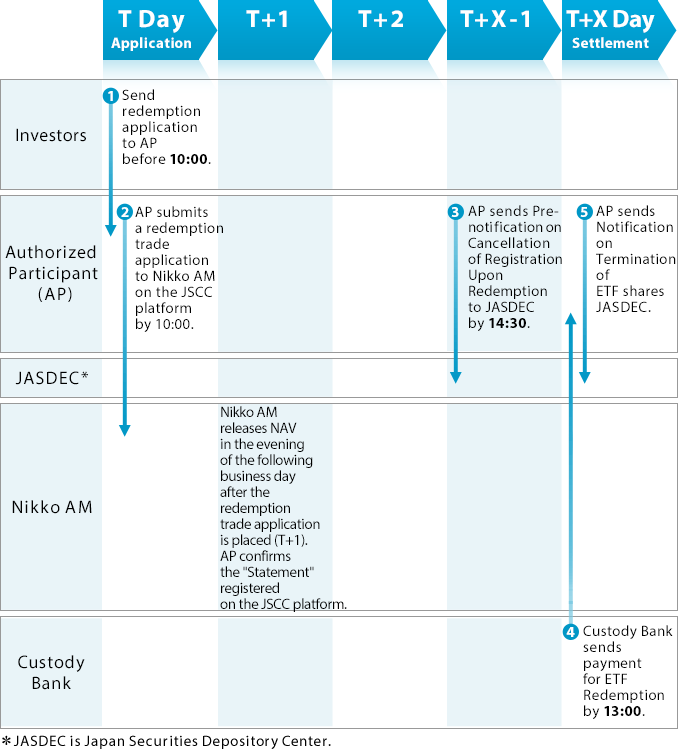On September 1, 2025, Nikko Asset Management Co., Ltd. will change its name to Amova Asset Management Co., Ltd.
The Fund seeks the net asset value per unit to track the performance of the yen-converted MSCI ACWI ex Japan Index by mainly investing in the separately stipulated investment trust securities.
Key information
| Name: | Listed Index Fund World Equity (MSCI ACWI) ex Japan | |
| Code: | 1554 |
Net Asset Value and Performance
Structure of the Fund
This Fund of Funds invests in securities held for investment trust.
- Index Fund Developed Countries Equity (for Institutional Investors)
The Fund invests mainly in International Developed Stock Index MSCI-KOKUSAI (No Hedge) Mother Fund, and aims to link its investment performance with the movement of yen-converted MSCI-KOKUSAI Index*.* MSCI-KOKUSAI Index is an index that represents the synthesized performance of the world major stock markets excluding Japan being published by MSCI Inc.
- Index Fund Emerging Countries Equity (for Institutional Investors)
The Fund invests mainly in International Emerging Stock Index MSCI Emerging (No Hedge) Mother Fund, and aims to link its investment performance with the movement of yen-converted MSCI Emerging Market Index*.* MSCI Emerging Market Index is an index that represents the synthesized performance of the world emerging countries' stock markets being published by MSCI Inc.
- Money Account Mother Fund
This fund seeks to achieve stable returns through stable management by investing in public and corporate bonds.
Fund Structure

| Fund Name | Listed Index Fund World Equity (MSCI ACWI) ex Japan Open-end/Overseas/Equities/ETF/Index type |
| Listed Exchange | Tokyo Stock Exchange |
| Issue Code | 1554 |
| Targeted Investments | Investment trust securities that seek to closely match the movement of the yen-converted MSCI ACWI ex Japan Index. |
| Date Listed | 8 March 2011 (launched on 3 March 2011) |
| Exchange Trading Unit | 1 unit |
| Trust period | Unlimited |
| Computation Period | From 21 January of each year to 20 January of the next year *The first computation period shall be from 3 March 2011 to 20 January 2012 |
| Closing Date | 20 January of each year |
| Dividends | All revenue from dividends arising from the trust assets will be, in principle, paid as dividends on the last day of the fiscal year after deducting expenses. *There is no guarantee on the payment or the amount of dividend. |
Fund Expenses
■Expenses to be borne directly by investors
| Subscription Fee | Independently set by Distributors *Please contact your Distributor for further information. *Subscription Fee is compensation for explanation and information providing about the Fund or investment environment, and is also including expense of clerical processing of the subscription. |
| Redemption Fee | Independently set by Distributors *Please contact your Distributor for further information. *Exchange Fee is compensation for clerical processing of the exchange. |
| Amount to be Retained in Trust Assets | 0.3% of NAV at the time of Exchange. |
■Costs paid indirectly by the customer for the trust assets (paid from the fund)
| TER (Total Expense Ratio) |
0.37% (TER includes Trust Fee, management fee and other costs below) Please refer to the prospectus for details. |

The total amount of expenses of the Fund to be borne by investors varies according to holding length and investment status, and thus cannot be shown.
Major Investment Restrictions
|
Trustee Companies
|
MSCI ACWI ex Japan Index is an equity index developed by MSCI Inc., and it is the weighted-average of overall investment return of equities in developed and emerging countries excluding Japan by market capitalization ratio and then assigning index values accordingly.

Further Information
Japan Exchange Group (JPX)
Japan Exchange Group publishes summaries and lists of the ETFs, as well as other valuable information on their website.
S&P Global
- Listed ETF iNav
Please click this link to see the iNAV.
MSCI Index
- MSCI ACWI Performance Data
After clicking the above link, please chose the following criteria.
Market : All Country (DM+EM)
Currency : USD
Index Level : Price
Size : Standard (Large+Mid Cap)
Please click "Search" and choose "ACWI ex Japan" in the list.
* For enquiries regarding this fund's holdings, please contact MSCI.
*Link to external sites.
Copyrights of the "MSCI ACWI ex Japan Index"
This Fund is not sponsored, endorsed, sold, or promoted by MSCI Inc and its affiliated companies, information provider, and other third parties (hereinafter refers to "MSCI"), who were involved or related in the editing, calculation, or creation of the MSCI index. MSCI index is an exclusive property of MSCI. The name of MSCI and MSCI Index is a service mark of MSCI and its affiliated companies and Nikko Asset Management Co., Ltd. is allowed to use this for specific a purpose. MSCI related companies make no expression or warranty, expressed or implied, as specified to the Fund’s owners or issuers, or any member of the public or organizations regarding the advisability of investing in securities generally or in the Fund particularly or in the ability of MSCI Index to track the performances of certain financial markets. MSCI and its related companies are licensers of MSCI Index and determine, create, and calculate the MSCI index regardless of specific trade marks, service marks or names, the Fund’s issuer or owners, and any member of the public or organizations. MSCI related companies have no obligation to consider the requests of the Fund’s issuers or owners, or any member of the public or organizations when determining, editing and calculating MSCI Index. MSCI related companies are not responsible for or been involved in the determination of the timing of, price at, or amount of the Fund to be issued, or in determination or calculation of the equation by which the Fund to be converted into cash, or the Fund’s conversion price. MSCI related companies assume no obligation to the Fund’s issuer or owner, any member of the public or organizations regarding, nor do they take any responsibility for management, marketing or trading of the Fund whatsoever.
MSCI obtains information required for calculating and using in the MSCI Index from sources it thinks are reliable, however, MSCI related companies do not make any guarantee of the originality, accuracy or completeness of MSCI Index or the data of the Index. MSCI related companies make no guarantee, expressed or implied, of the results to be obtained by the Fund’s issuer or owner, or any member of the public or organizations from the use of this Index or data included therein. MSCI related companies take no responsibility for any error, omission in the data included or the discontinuation of MSCI Index. Furthermore, MSCI related companies expressively disclaim all warranties or conditions of merchantability or suitability for a particular purpose or use of this Index or the data contained therein, and make no guarantee, express or implied, on merchantability or suitability of this Index or the data contained therein. Without limiting any of the foregoing, MSCI related companies are not responsible for any direct, indirect, special, punitive, or consequential damages, and all other damages (including lost profits) arising from the use of the data contained therein, even if notified of the possibility of such damages in advance.
The Fund’s purchasers, distributors, owners or any member of the public or organizations cannot use or mention MSCI's name, trademark or service mark for the purpose of sponsoring, endorsing, selling, or promoting the Fund without checking whether it is necessary to obtain MSCI’s prior consent. Any member of the public or organizations cannot mention their relationship with MSCI without obtaining MSCI's written approval in advance.
- 5 Mar 2025 — Earnings Report for Fiscal Year ended Jan 2025
- 2 Sep 2024 — Interim Earnings Report for Fiscal Year ending Jan 2025
- 4 Mar 2024 — Earnings Report for Fiscal Year ended Jan 2024
- 1 Sep 2023 — Interim Earnings Report for Fiscal Year ending Jan 2024
- 3 Mar 2023 — Earnings Report for Fiscal Year ended Jan 2023
- 2 Sep 2022 — Interim Earnings Report for Fiscal Year ending Jan 2023
- 4 Mar 2022 — Earnings Report for Fiscal Year ended Jan 2022
- 2 Sep 2021 — Interim Earnings Report for Fiscal Year ending Jan 2022
- 5 Mar 2021 — Earnings Report for Fiscal Year ended Jan 2021
- 2 Sep 2020 — Interim Earnings Report for Fiscal Year ending Jan 2021 (21 Jan 2020 - 20 Jul 2020)
- 4 Mar 2020 — Earnings Report for Fiscal Year ended Jan 2020 (21 Jan 2019 - 20 Jan 2020)
- 2 Sep 2019 — Interim Earnings Report for Fiscal Year ending Jan 2020 (21 Jan 2019 - 20 Jul 2019)
- 5 Mar 2019 — Earnings Report for Fiscal Year ended Jan 2019 (21 Jan 2018 - 20 Jan 2019)
- 31 Aug 2018 — Interim Earnings Report for Fiscal Year ending Jan 2019 (21 Jan 2018 - 20 Jul 2018)
- 5 Mar 2018 — Earnings Report for Fiscal Year ended Jan 2018 (21 Jan 2017 - 20 Jan 2018)
- 31 Aug 2017 — Interim Earnings Report for Fiscal Year ending Jan 2018 (21 Jan 2017 - 20 Jul 2017)
- 2 Mar 2017 — Earnings Report for Fiscal Year ended Jan 2017 (21 Jan 2016 - 20 Jan 2017)
- 2 Sep 2016 — Interim Earnings Report for Fiscal Year ending Jan 2017 (21 Jan 2016 - 20 Jul 2016)
- 4 Mar 2016 — Earnings Report for Fiscal Year ended Jan 2016 (21 Jan 2015 - 20 Jan 2016)
- 2 Sep 2015 — Interim Earnings Report for Fiscal Year ending Jan 2016 (21 Jan 2015 - 20 Jul 2015)
- 5 Mar 2015 — Earnings Report for Fiscal Year ended Jan 2015 (21 Jan 2014 - 20 Jan 2015)
- 2 Sep 2014 — Interim Earnings Report for Fiscal Year ending Jan 2015 (21 Jan 2014 - 20 Jul 2014)
- 5 Mar 2014 — Earnings Report for Fiscal Year ended Jan 2014 (21 Jan 2013 - 20 Jan 2014)
- 3 Sep 2013 — Interim Earnings Report for Fiscal Year ending Jan 2014 (21 Jan 2013 - 20 Jul 2013)
- 6 Mar 2013 — Earnings Report for Fiscal Year ended Jan 2013 (21 Jan 2012 - 20 Jan 2013)
- 31 Aug 2012 — Interim Earnings Report for Fiscal Year ending Jan 2013 (21 Jan 2012 - 20 Jul 2012)
This Fund can be applied for as a cash creation and a cash redemption at Authorised Participants in addition to the Tokyo Stock Exchange. When applying as a direct addition and exchange, please keep in mind that we cannot accept your application on the following dates:
Authorized Participants
- SMBC Nikko Securities Inc.
- Citigroup Global Markets Japan Inc.
- ABN AMRO Clearing Tokyo Co., Ltd.
- Barclays Securities Japan Limited
- BNP Paribas Securities (Japan) Limited
- BofA Securities Japan Co., Ltd.
- Goldman Sachs Japan Co.,Ltd.
- Mitsubishi UFJ Morgan Stanley Securities Co., Ltd.
- Nomura Securities Co., Ltd.
Daily Creation and redemption are based on ETF's NAV calculated in early evening. Confirm non-tradable days by referring to trading calendar on our official homepage. Basket for creation is continually-updated on our official homepage.
Basically sell/buy at last price of T day's market while FX rate is TTM of one business day after the application (10am on T+1)
The flow chart below is showing the creation/redemption process for Nikko AM ETFs. Please note that transactions cannot be processed for days on which applications are not accepted.
Creation Flow for Cash Creation/Redemption Type ETFs

Redemption Flow for Cash Creation/Redemption Type ETFs

Investors are not guaranteed the investment principal that they commit. Investors may incur a loss and the value of their investment principal may fall below par as the result of a decline in market price or NAV. All profits and losses arising from investments in the Fund belong to the investors (beneficiaries). This fund is different from saving deposit.
This Fund will invest mainly in stocks, therefore, the NAV may fall and the Fund may incur losses due to falls in the prices of stocks, or worsening financial standing or business results of stocks issuers. Losses may also be incurred due to exchange rate fluctuation when investing in assets denominated in foreign currencies.
Major risks are as follows:
1. Price Fluctuation Risk
Stock prices fluctuate as they are affected by information on the company's growth rate and profitability as well as changes in such information. They also fluctuate as they are affected by economic and political conditions in Japan and abroad. There is a risk that the Fund will suffer material losses if unexpected changes occur in stock price movements or liquidity.
In general, stocks of emerging countries tend to exhibit higher price volatility compared with those of developed countries. This can also have a significant impact on the Fund's NAV.
Corporate and government bonds generally have a price fluctuation risk arising from changes in interest rates. Generally, their prices go down when interest rates rise, causing the NAV of the funds to fall. The degree of price fluctuation varies depending on the remaining time to maturity, coupon rate and other issuance conditions.
2. Liquidity Risk
Where the market size or trading volume is small, buying and selling prices for securities may be largely affected. This results in the risk that securities cannot be traded at the expected prices, sold at the appraised prices, or that trading volume is limited regardless of prices. This creates the risk of unexpected losses.
In general, stocks of emerging countries may exhibit higher liquidity risk compared with those of developed countries due to smaller market scale and trading amount.
3. Credit Risk
There is a risk that the Fund will incur material losses in the event of a serious crisis that directly or indirectly affects the business of a corporation in which the Fund invests. The prices of stocks of issuers may substantially decrease (possibly to zero) due to fears of default or corporate bankruptcy, which can contribute to a decline in the Fund's NAV.
If a default has occurred or is expected to occur, for issuers of public and corporate bonds or short-term financial assets, the prices of such public and corporate bonds or short-term financial assets decline (the value could even fall to zero). This results in a decline of the Fund's NAV. In addition, if default in fact occurs, there is a high possibility of being unable to collect investment funds.
4. Currency Fluctuation Risk
For foreign-currency-denominated assets, in general, if the yen is stronger than the currencies of such assets, the Fund's NAV will decline.
In general, emerging countries' currencies show higher volatility than those of developed countries.
5. Country Risk
There is a risk that the Fund may incur material losses due to market trends or the flow of funds, including emergencies in invested countries (such as financial crises, government default due to financial reasons, significant policy changes or introductions of new regulations including asset freezes, natural disasters, coups or significant political changes, or war). In such cases, the fund cannot be managed in accordance with the investment policy.
In general, emerging countries do not disclose enough information, or accurate information cannot be obtained in a timely manner.
Factors Contributing to the discrepancies between yen-converted MSCI ACWI ex Japan Index and NAV
This Fund seeks to ensure that its NAV has the same volatility as the yen-converted MSCI ACWI ex Japan Index, however, we cannot always guarantee that the Fund will have the same volatility as the Index due to the following factors attributable to this Fund and to the investment trust securities invested in by this Fund:
- Lag in the timing of fund inflows and to the purchase of investment trust securities.
- The potential market impact from the trading, etc., of individual issues when portfolio adjustments are made due to changes in selected issues on MSCI ACWI ex Japan Index or capital transfers, or costs borne by the Fund such as trust fees, brokerage commission, and audit costs, etc.
- The share-lending fee from securities or dividends of incorporated issues.
- When derivative transactions such as futures are conducted, discrepancies in price movements between such transactions and part or all of the constituent issues of the MSCI ACWI ex Japan Index.
Discrepancies between the market prices at which stocks are traded on the exchange and the NAV
This Fund is listed on and will be publicly traded on the Tokyo Stock Exchange; however, the market price of the units will depend mainly on the demand for the Fund, its investment performance, and how attractive it is to investors in comparison to alternative investments, etc. We cannot predict whether this fund will be traded at a market value below or above its NAV.
*The prices of securities targeted for investment of this Fund will fluctuate due to the aforementioned risks. Therefore, please note that this Fund itself has these risks as well.
*The factors that contribute to fluctuations in the NAV are not limited to those listed above.
Additional Considerations
- These distribution materials have been created by Nikko Asset Management with the intention of communicating information on "Listed Index Fund World Equity (MSCI ACWI) ex Japan" in order to increase investors' understanding of this Fund.
- The provisions stipulated in Article 37-6 of the Financial Instruments and Exchange Act ("cooling-off period") are not applicable to Fund transactions.
- This Fund differs from deposits or insurance policies in that it is not protected by the Deposit Insurance Corporation of Japan or the Policyholders Protection Corporation of Japan. Furthermore, units purchased from registered financial institutions, such as banks, are exempted from compensation by the Japan Investor Protection Fund.
- When the Fund faces big redemption causing short term cash requirement or sudden change in the main trading market condition, there can be temporal decline in the liquidity of holding assets, resulting in the risks that Fund unable to trade securities at the expected market prices or appraised prices, or encounters limitation in trading volume. This may result in the negative influence on NAV, suspension of redemption applications, or delay in making payment of redemption.
- When applying for the purchase of this fund, please read carefully the documents that are provided to you before concluding the contract.


